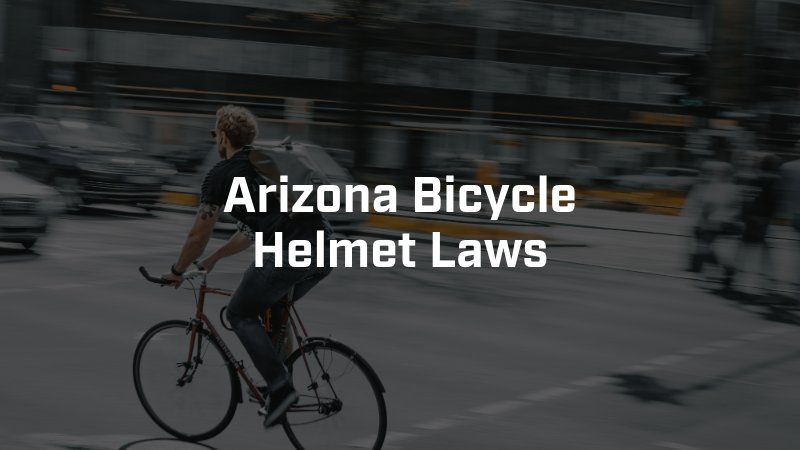Understanding Arizona bicycle helmet laws is crucial for any person who wishes to ride legally on Arizona roadways. Currently, there are no state-level requirements that bicyclists wear a helmet when riding. However, local jurisdictions throughout Arizona do have specific bicycle helmet laws, typically put in place based on the age of the rider.

Data Shows That Helmets Save Lives
Data shows that, during the most recent reporting year, there were 1,230 total preventable bicycle-related deaths across the country, and the NSC states that one-third of non-fatal bicycle injuries are to the head. Data from the Consumer Product Safety Commission (CPSC) shows that a majority of the 80,000 bicycling-related head injuries treated in the emergency room each year are actually brain injuries, ranging from concussions to more severe traumatic brain injuries.
Where Are Bike Helmets Required in AZ?
As we mentioned, the state of Arizona does not specifically require individuals to wear helmets when riding their bicycles. However, three cities – Tucson, Sierra Vista, and Yuma – along with Pima County, have mandatory bicycle helmet laws in place for riders under the age of 18.
While experienced Phoenix personal injury lawyers recommend wearing bike helmets, these three cities and this single county do not legally require riders 18 years of age or older to wear bicycle helmets.
What is the Best Type of Helmet?
There is no specific brand of helmet recommended by the federal government or any other agency within Arizona. However, bicyclists are strongly encouraged to wear helmets approved by the US Department of Transportation, which means they meet the Federal Motor Vehicle Safety Standard (FMVSS) 218:
- Purpose and Scope: FMVSS 218 aims to reduce deaths and injuries among motorcyclists by ensuring that helmets provide adequate protection during crashes. It applies to helmets designed for use by motorcyclists and other motor vehicle users.
- Performance Requirements. The standard includes several tests to measure a helmet’s ability to protect the wearer:
- Impact Test. This checks how well the helmet can absorb shock during a collision. It involves dropping a helmet from a specific height onto an anvil and measuring the acceleration inside the helmet. The standard permits a maximum acceleration of 400 G.
- Penetration Test. This test assesses the helmet’s ability to prevent objects from penetrating through it. A sharp object gets dropped onto the helmet, and the object must not penetrate enough to touch the head form inside.
- Retention System Test. This evaluates the strength of the helmet’s chin strap. The strap is subjected to varying loads to ensure it doesn’t stretch excessively or break under pressure.
- Certification Label. Helmets compliant with FMVSS 218 must display a DOT (Department of Transportation) label. This label signifies that the helmet meets the required safety standards. Recent updates to the standard have made the labeling more specific to prevent counterfeit labels on non-compliant helmets. The label should include the manufacturer’s name, model number or name, the DOT symbol, “FMVSS 218,” and the word “Certified.”
- Beware of Non-Compliant Helmets. Not all helmets sold as “motorcycle helmets” meet FMVSS 218 standards. Some are sold as “novelty helmets” and do not provide adequate protection in a crash. These helmets are usually lighter, thinner, and lack a sturdy chin strap.
Do You Need an Attorney After a Bicycle Crash?
If you or somebody you care about has been injured in a bicycle accident caused by the negligent actions of another driver in Arizona, we encourage you to contact a lawyer immediately. A Phoenix bicycle accident attorney can help you understand your best options moving forward to recover compensation for your losses. You may be entitled to coverage of your medical bills, lost income, property damage expenses, and even pain and suffering damages.
